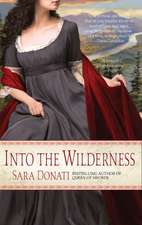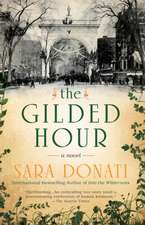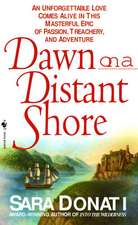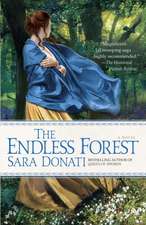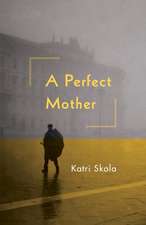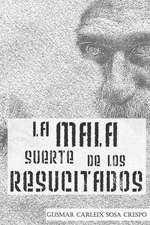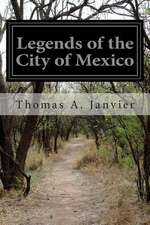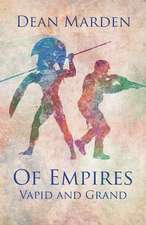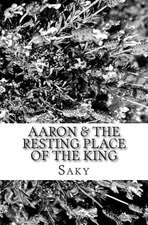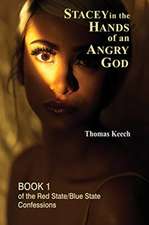Fire Along the Sky
Autor Sara Donatien Limba Engleză Paperback – 31 oct 2005
The year is 1812 and Hannah Bonner has returned to her family’s mountain cabin in Paradise. But Nathaniel and Elizabeth Bonner can see that Hannah is not the same woman as when she left. For their daughter has come home without her husband and without her son…and with a story of loss and tragedy that she can’t bear to tell. Yet as Hannah resumes her duties as a gifted healer among the sick and needy, she finds that she is also slowly healing herself. Little does she realize that she is about to be called away to face her greatest challenge ever.
As autumn approaches, news of the latest conflict with Britain finds the young men of Paradise—including eighteen-year-old Daniel Bonner—eager to take up arms. Against their better judgment, Nathaniel and Elizabeth must let him go, just as they must let his twin sister Lily, a stubborn beauty, pursue her independence in Montreal. But on the eve of the War of 1812, an unexpected guest arrives from Scotland: It is the Bonners’ distant cousin, the newly widowed Jennet Scott of Carryckcastle. Far from home, Lily and Jennet will each learn the price of pursuing their dreams and the possibility of true love.
But it’s Hannah herself who must risk everything once more—this time to save Daniel, who’s been taken prisoner by the British. As the distant thunder of war threatens Paradise, Hannah may learn to live—and maybe love—again in one final act of courage, duty, and sacrifice.
A gifted writer, a master storyteller, and a first-rate historian, Sara Donati has written a powerful, poignant, and movingly romantic novel that chronicles the lives and adventures of a family as compelling and unforgettable as any in American fiction.
From the Hardcover edition.
| Toate formatele și edițiile | Preț | Express |
|---|---|---|
| Paperback (2) | 60.80 lei 3-5 săpt. | |
| Dell Publishing Company – 31 oct 2005 | 60.80 lei 3-5 săpt. | |
| HarperCollins Publishers – 30 sep 2008 | 160.15 lei 17-23 zile |
Preț: 60.80 lei
Nou
Puncte Express: 91
Preț estimativ în valută:
11.64€ • 12.63$ • 9.77£
11.64€ • 12.63$ • 9.77£
Carte disponibilă
Livrare economică 01-15 aprilie
Preluare comenzi: 021 569.72.76
Specificații
ISBN-13: 9780553582772
ISBN-10: 0553582771
Pagini: 658
Dimensiuni: 107 x 170 x 30 mm
Greutate: 0.3 kg
Editura: Dell Publishing Company
ISBN-10: 0553582771
Pagini: 658
Dimensiuni: 107 x 170 x 30 mm
Greutate: 0.3 kg
Editura: Dell Publishing Company
Notă biografică
Sara Donati is the pen name of Rosina Lippi. She lives with her husband, daughter, and various pets in an area between the Cascade Mountains and the Puget Sound.
Extras
Chapter One
Early September 1812
Paradise, New-York State
Hot sun and abundant rain: Lily Bonner said a word of thanks for a good summer and the harvest it had given them, and in the same breath she wished her hoe to the devil and herself away.
But there was no chance of escape. Even Lily's mother, whose usual and acknowledged place was at her writing desk or in a classroom, had come to help; everyone must, this close to harvest. The women must, Lily corrected herself: the men were in the cool of the forests.
She glanced up and caught sight of her mother, all furious concentration as she moved along her row. She swung her hoe with the same easy rhythm as Many-Doves. They were an army of two marching through the tasseled rows, corn brushing shoulders and cheeks as if to thank the women for their care.
For all their lives the Mohawk women had spent the best part of every summer day in the fields tending the three sisters: corn, beans, squash. But Lily's mother had been raised in a great English manor house with servants, and she had not held a hoe in her hands--white skin, ink-stained fingers--until she was thirty. Elizabeth Middleton had come to New-York as a spinster, a teacher, a crusader; in just six months' time she had become someone very different.
Lily understood a simple truth: the day came for every woman when she must choose one kind of life or another or let someone else make the choice for her. For some the crucial moment came suddenly, without warning and when least expected; others saw it approaching, pushing up out of the ground like a weed.
It was an image that would not leave her mind, and so she had finally spoken about it to her mother, holding the idea out in open palms like the egg of an unfamiliar and exotic bird.
And how it had pleased her mother, this simple gift. She sat contemplating her folded hands for a moment, Quaker-gray eyes fixed on the horizon and a tilt to her head that meant her mind was far away, reliving some moment, recalling a phrase read last week or ten years ago. When she spoke, finally, it was not with the quotation Lily expected.
She said, "There are so many choices available to you, such riches for the taking. The very best advice I can give you is very simple. You have heard me say it in different ways, but I'll put it as simply as I can. When it comes time to choose, try to favor the rational over the subjective."
At that Lily had laughed out loud, in surprise and disappointment. Who else had a mother who would say such a thing, and in such a studiously odd way? Other people were satisfied with quoting the bible and old wives' wisdoms, but Lily had a mother who preferred Kant to the Proverbs. Who made decisions with her head when she could, and was convinced that in doing so, her other needs would be satisfied.
Certainly she could point to even the most unconventional choices she had made in her life and argue that they were rational, and more than that: that she was happy with the choices she had made. As most of the other women Lily knew were happy with the lives they had.
Her cousin Kateri had chosen a husband from the Turtle clan at Good Pasture and gone with him to live among the Mohawk on the Canadian side of the St. Lawrence. It was too early yet to know how well she had chosen, or how badly. Other women misstepped and struggled mightily forever after; there were a few like that in Paradise, burning bright with the anger they must swallow day by day.
And then there was Hannah, her own sister, who had chosen to leave home and chosen well, in spite of the fact that the wars in the west had taken it all away from her. Now she was neither angry nor content but merely alive, as placid and blank as the clouds overhead and just as distant.
The war was coming closer all the time, and while they had not heard a single shot fired and none of the men had gone to join the fighting--not yet, Lily corrected herself--there were casualties. Lily counted herself among them.
Without the war she would have left two months ago for New-York City. The plan had taken a full year to finalize: she would live with her uncle and aunt Spencer in their fine house on Whitehall Street and study art with the teachers they had found for her. In time, when she had advanced far enough, she would travel with them to Europe where she could study the work of the great artists.
But all of that had come to a sudden end, because men must fight and to do that they started wars. Her own brother was infected with that need, her twin brother. The strangeness of it never faded.
Many-Doves was telling a story. Lily's mother laughed in response, a gentle hiccupping laughter that meant she was embarrassed. All these years living among the plain-speaking Kahnyen'kehoka women, but her mother still blushed and laughed like a proper young English lady when the talk turned to men and women and the things they were to each other.
This is the life my mother chose. Lily repeated this sentence to herself often, and every time she was overcome with admiration and resentment in equal measure.
When Many-Doves decided the time was right they put down the hoes to eat in the shade of the birch trees. Lily filled empty gourds with water from the stream and they unwrapped a parcel of cornbread and boiled eggs and peppery radishes plucked this morning from the kitchen garden, still trailing clots of damp earth. Lily listened for a while as they talked about the coming harvest and the day's work.
When it was clear that today was not the day they would decide among themselves what was to be done to heal Hannah, Lily went off to wade in the lake, digging her toes into the mud and pulling her skirts up through her belt so that the duck grass tickled her bare calves. She wet her handkerchief and wiped her face and the back of her neck free of dust and grit, thankful for the cool and the breeze and the very colors of the sky. Lily felt her mother watching her, her love and pride and worry radiating as hot and true as the sun itself.
The sound of drumming hooves brought her out of her daydream. The others heard it too, all of them turning in the direction of the village, their heads tilted at just the same angle, listening hard.
"Riders!" Her brother Gabriel exploded out of a clump of grass almost under Lily's nose, all pinwheeling arms and legs and spraying water. Annie, Many-Doves' daughter, was just behind him and they galloped toward the women, both of them sleekly wet and naked. Gabriel's skin was burned almost as dark as Annie's, so that his gray eyes worked silver.
"Five riders!" Annie shouted as if she must make herself heard on the top of the mountain.
"We hear." Many-Doves raised a hand to screen out the sun as she looked in the direction of the village.
"Your Uncle Todd's letter said he hoped to be home today," Lily's mother said, wiping her neck with a kerchief. "But who does he have with him?" Her expression was a combination of worry and anticipation and excitement too.
"Whoever it is, they must be lost," Lily said, wishing herself wrong even as she said the words. "No stranger ever comes to Paradise on purpose."
The cornfield was on a little rise that gave them a good view of the village on the other side of the lake: the building that had once been the church but now was just a meetinghouse, as no minister seemed to want to stay in Paradise; the well; the dusty road that widened in front of the trading post and then narrowed again to disappear almost immediately into the woods; a few cabins; the smithy; here and there a curl of smoke from a chimney they could not see.
Every year Paradise was a little smaller, like an old woman hunching down into her bones. When a family gave up and moved on the cabin stayed empty and the garden around it lay fallow, simply because Uncle Todd could not be bothered to look for new tenants. At this moment the only sign of life was a cat asleep on the wall of the well, her fur gleaming in the sun. But folks would come soon enough: so many riders at once was almost as good as a fire for waking them up.
The sound of hooves on the road grew louder and louder still, and then the riders showed themselves. Five of them, as Annie had foretold. Uncle Todd and cousin Ethan among them--Lily made out that much and nothing about the others; she did not have her father's keen eyesight. Gabriel had it, though. Gabriel and Daniel and all her brothers; eyesight keen enough to count acorns on the highest branch. And now young Gabriel had caught sight of something that made every muscle quiver. He turned his head toward the women and his eyes were perfectly round with anticipation.
"Yes," Elizabeth said, answering the question he hadn't asked. "But put your breechclout on first. You too, Annie, you can't go greet people in such a state."
To Lily she said, "That will slow them down a little, at least. Come along, maybe we can get there first."
Without any discussion Many-Doves began to gather the hoes together.
"But there's six hours of sun left," Lily said as her mother moved off. She found herself as uneasy about the strangers as she had been eager to see them just a moment ago.
Many-Doves laughed and poked her shoulder with two fingers. "As if you could work now with your brother just come home."
All of the riders had dismounted but for one, a smaller figure--a lady by her bearing, Lily saw now. One of the men had a hand on the woman's saddle, his head canted up to talk to her--argue with her, Lily corrected herself, taking in the way he held himself--and in that moment she recognized him.
"Luke," she said.
Her brother Luke, come from Montreal without word or warning, and in time of war. Lily felt the shock of it in the tips of her fingers, shock and joy and a flash of fear.
Lily's mother had recognized him too, and picked up her skirts and her pace both. Gabriel and Annie streaked past, heels flashing.
"Who is that lady?" Lily asked out loud.
Many-Doves made an approving sound deep in her throat. "Maybe your brother has finally brought a wife home with him."
"They argue as though they were married," Lily agreed.
Luke turned away from the stranger and pulled his hat from his head in frustration. The lady turned her horse away and started up the path that led to Uncle Todd's place while Luke watched her, his fists at his sides.
Richard Todd was the most prominent man in Paradise, the richest in both land and money, and a trained medical doctor. His fine two-story house was the only brick building in a village of squared-log cabins. It had been the largest house until the Widow Kuick bought the mill and built her own fine house, but the Kuick place had fallen into disrepair these last years and sat hunched on the hillside overlooking the village, like a frowsy old woman without the wits to look after herself.
Richard Todd was rarely at home and the Kuick widows rarely stepped out of doors, but when Richard went off to Johnstown or Albany, his place in the world and the things he called his own--house, gardens, pastures, cornfields, barns and outbuildings, books and animals and plowshares--were cared for. A small kingdom beautifully kept, and the doctor had spent less than three weeks in residence in the last six months.
It was a situation that suited his housekeeper very well. At seventy-nine Curiosity Freeman still ran things, overseeing the house servants--her own granddaughters--and the farm workers like a benevolent general presiding over well-trained and adoring troops.
Together Curiosity and Elizabeth and Many-Doves looked after the medical needs of the village; they dosed children for worms, set broken bones, delivered babies, laid out the dead and comforted the living. Sometimes Curiosity went for days without giving the absent doctor a thought.
They were in the laboratory, the farthest of the outbuildings on the Todd property. Once this had been the heart of Richard's medical practice, and it had surprised Hannah to find that while she was gone it had been given over to a different kind of research. According to Curiosity, Joshua Hench had been conducting experiments with metals and blackpowder explosives, all with Richard's approval.
"Wouldn't do no good to tell you," Curiosity said in response to Hannah's questions. Her irritation was sharp and clear on her face. "You just have to wait and see for yourself. Unless you was wanting the laboratory for your own work?" She looked at Hannah hopefully. "Then Joshua will just have to clear out, go blow himself up someplace else where I don't got to hear it happen."
Hannah didn't want the laboratory; she hadn't come home to practice medicine, after all, and she said so.
"You've expressed your concerns to Richard, I take it."
At that Curiosity just snorted. "You wave a firecracker under a man's nose, he ain't going to pay no attention, no matter what kind of sense you be talking." Then she pushed out a sigh. "Ain't nothing to be done, but it do set my teeth on edge."
Hannah was relieved if Curiosity was willing to abandon the subject. She turned her attention to the stack of Richard's daybooks on the standing desk. Ledger after ledger in which he had logged his daily work: treatments, patients seen, raw materials ordered from Albany and New-York City and beyond, experiments he had undertaken and the results they had produced. All neat, well ordered and full of Richard's dry observations.
June 4 1808. Set right tibula on the youngest Ratz boy. Subject healthy if dull-witted ten-year-old; clean break; no tearing to the muscle or ligaments; prognosis good if he can be kept out of trees.
Curiosity had come along to keep Hannah company while she read. She sat near the door in the light from the single window, snapping beans in a bowl in her lap.
"Richard has been away a long time," Hannah noted; the last entry in the daybook was six months old.
Early September 1812
Paradise, New-York State
Hot sun and abundant rain: Lily Bonner said a word of thanks for a good summer and the harvest it had given them, and in the same breath she wished her hoe to the devil and herself away.
But there was no chance of escape. Even Lily's mother, whose usual and acknowledged place was at her writing desk or in a classroom, had come to help; everyone must, this close to harvest. The women must, Lily corrected herself: the men were in the cool of the forests.
She glanced up and caught sight of her mother, all furious concentration as she moved along her row. She swung her hoe with the same easy rhythm as Many-Doves. They were an army of two marching through the tasseled rows, corn brushing shoulders and cheeks as if to thank the women for their care.
For all their lives the Mohawk women had spent the best part of every summer day in the fields tending the three sisters: corn, beans, squash. But Lily's mother had been raised in a great English manor house with servants, and she had not held a hoe in her hands--white skin, ink-stained fingers--until she was thirty. Elizabeth Middleton had come to New-York as a spinster, a teacher, a crusader; in just six months' time she had become someone very different.
Lily understood a simple truth: the day came for every woman when she must choose one kind of life or another or let someone else make the choice for her. For some the crucial moment came suddenly, without warning and when least expected; others saw it approaching, pushing up out of the ground like a weed.
It was an image that would not leave her mind, and so she had finally spoken about it to her mother, holding the idea out in open palms like the egg of an unfamiliar and exotic bird.
And how it had pleased her mother, this simple gift. She sat contemplating her folded hands for a moment, Quaker-gray eyes fixed on the horizon and a tilt to her head that meant her mind was far away, reliving some moment, recalling a phrase read last week or ten years ago. When she spoke, finally, it was not with the quotation Lily expected.
She said, "There are so many choices available to you, such riches for the taking. The very best advice I can give you is very simple. You have heard me say it in different ways, but I'll put it as simply as I can. When it comes time to choose, try to favor the rational over the subjective."
At that Lily had laughed out loud, in surprise and disappointment. Who else had a mother who would say such a thing, and in such a studiously odd way? Other people were satisfied with quoting the bible and old wives' wisdoms, but Lily had a mother who preferred Kant to the Proverbs. Who made decisions with her head when she could, and was convinced that in doing so, her other needs would be satisfied.
Certainly she could point to even the most unconventional choices she had made in her life and argue that they were rational, and more than that: that she was happy with the choices she had made. As most of the other women Lily knew were happy with the lives they had.
Her cousin Kateri had chosen a husband from the Turtle clan at Good Pasture and gone with him to live among the Mohawk on the Canadian side of the St. Lawrence. It was too early yet to know how well she had chosen, or how badly. Other women misstepped and struggled mightily forever after; there were a few like that in Paradise, burning bright with the anger they must swallow day by day.
And then there was Hannah, her own sister, who had chosen to leave home and chosen well, in spite of the fact that the wars in the west had taken it all away from her. Now she was neither angry nor content but merely alive, as placid and blank as the clouds overhead and just as distant.
The war was coming closer all the time, and while they had not heard a single shot fired and none of the men had gone to join the fighting--not yet, Lily corrected herself--there were casualties. Lily counted herself among them.
Without the war she would have left two months ago for New-York City. The plan had taken a full year to finalize: she would live with her uncle and aunt Spencer in their fine house on Whitehall Street and study art with the teachers they had found for her. In time, when she had advanced far enough, she would travel with them to Europe where she could study the work of the great artists.
But all of that had come to a sudden end, because men must fight and to do that they started wars. Her own brother was infected with that need, her twin brother. The strangeness of it never faded.
Many-Doves was telling a story. Lily's mother laughed in response, a gentle hiccupping laughter that meant she was embarrassed. All these years living among the plain-speaking Kahnyen'kehoka women, but her mother still blushed and laughed like a proper young English lady when the talk turned to men and women and the things they were to each other.
This is the life my mother chose. Lily repeated this sentence to herself often, and every time she was overcome with admiration and resentment in equal measure.
When Many-Doves decided the time was right they put down the hoes to eat in the shade of the birch trees. Lily filled empty gourds with water from the stream and they unwrapped a parcel of cornbread and boiled eggs and peppery radishes plucked this morning from the kitchen garden, still trailing clots of damp earth. Lily listened for a while as they talked about the coming harvest and the day's work.
When it was clear that today was not the day they would decide among themselves what was to be done to heal Hannah, Lily went off to wade in the lake, digging her toes into the mud and pulling her skirts up through her belt so that the duck grass tickled her bare calves. She wet her handkerchief and wiped her face and the back of her neck free of dust and grit, thankful for the cool and the breeze and the very colors of the sky. Lily felt her mother watching her, her love and pride and worry radiating as hot and true as the sun itself.
The sound of drumming hooves brought her out of her daydream. The others heard it too, all of them turning in the direction of the village, their heads tilted at just the same angle, listening hard.
"Riders!" Her brother Gabriel exploded out of a clump of grass almost under Lily's nose, all pinwheeling arms and legs and spraying water. Annie, Many-Doves' daughter, was just behind him and they galloped toward the women, both of them sleekly wet and naked. Gabriel's skin was burned almost as dark as Annie's, so that his gray eyes worked silver.
"Five riders!" Annie shouted as if she must make herself heard on the top of the mountain.
"We hear." Many-Doves raised a hand to screen out the sun as she looked in the direction of the village.
"Your Uncle Todd's letter said he hoped to be home today," Lily's mother said, wiping her neck with a kerchief. "But who does he have with him?" Her expression was a combination of worry and anticipation and excitement too.
"Whoever it is, they must be lost," Lily said, wishing herself wrong even as she said the words. "No stranger ever comes to Paradise on purpose."
The cornfield was on a little rise that gave them a good view of the village on the other side of the lake: the building that had once been the church but now was just a meetinghouse, as no minister seemed to want to stay in Paradise; the well; the dusty road that widened in front of the trading post and then narrowed again to disappear almost immediately into the woods; a few cabins; the smithy; here and there a curl of smoke from a chimney they could not see.
Every year Paradise was a little smaller, like an old woman hunching down into her bones. When a family gave up and moved on the cabin stayed empty and the garden around it lay fallow, simply because Uncle Todd could not be bothered to look for new tenants. At this moment the only sign of life was a cat asleep on the wall of the well, her fur gleaming in the sun. But folks would come soon enough: so many riders at once was almost as good as a fire for waking them up.
The sound of hooves on the road grew louder and louder still, and then the riders showed themselves. Five of them, as Annie had foretold. Uncle Todd and cousin Ethan among them--Lily made out that much and nothing about the others; she did not have her father's keen eyesight. Gabriel had it, though. Gabriel and Daniel and all her brothers; eyesight keen enough to count acorns on the highest branch. And now young Gabriel had caught sight of something that made every muscle quiver. He turned his head toward the women and his eyes were perfectly round with anticipation.
"Yes," Elizabeth said, answering the question he hadn't asked. "But put your breechclout on first. You too, Annie, you can't go greet people in such a state."
To Lily she said, "That will slow them down a little, at least. Come along, maybe we can get there first."
Without any discussion Many-Doves began to gather the hoes together.
"But there's six hours of sun left," Lily said as her mother moved off. She found herself as uneasy about the strangers as she had been eager to see them just a moment ago.
Many-Doves laughed and poked her shoulder with two fingers. "As if you could work now with your brother just come home."
All of the riders had dismounted but for one, a smaller figure--a lady by her bearing, Lily saw now. One of the men had a hand on the woman's saddle, his head canted up to talk to her--argue with her, Lily corrected herself, taking in the way he held himself--and in that moment she recognized him.
"Luke," she said.
Her brother Luke, come from Montreal without word or warning, and in time of war. Lily felt the shock of it in the tips of her fingers, shock and joy and a flash of fear.
Lily's mother had recognized him too, and picked up her skirts and her pace both. Gabriel and Annie streaked past, heels flashing.
"Who is that lady?" Lily asked out loud.
Many-Doves made an approving sound deep in her throat. "Maybe your brother has finally brought a wife home with him."
"They argue as though they were married," Lily agreed.
Luke turned away from the stranger and pulled his hat from his head in frustration. The lady turned her horse away and started up the path that led to Uncle Todd's place while Luke watched her, his fists at his sides.
Richard Todd was the most prominent man in Paradise, the richest in both land and money, and a trained medical doctor. His fine two-story house was the only brick building in a village of squared-log cabins. It had been the largest house until the Widow Kuick bought the mill and built her own fine house, but the Kuick place had fallen into disrepair these last years and sat hunched on the hillside overlooking the village, like a frowsy old woman without the wits to look after herself.
Richard Todd was rarely at home and the Kuick widows rarely stepped out of doors, but when Richard went off to Johnstown or Albany, his place in the world and the things he called his own--house, gardens, pastures, cornfields, barns and outbuildings, books and animals and plowshares--were cared for. A small kingdom beautifully kept, and the doctor had spent less than three weeks in residence in the last six months.
It was a situation that suited his housekeeper very well. At seventy-nine Curiosity Freeman still ran things, overseeing the house servants--her own granddaughters--and the farm workers like a benevolent general presiding over well-trained and adoring troops.
Together Curiosity and Elizabeth and Many-Doves looked after the medical needs of the village; they dosed children for worms, set broken bones, delivered babies, laid out the dead and comforted the living. Sometimes Curiosity went for days without giving the absent doctor a thought.
They were in the laboratory, the farthest of the outbuildings on the Todd property. Once this had been the heart of Richard's medical practice, and it had surprised Hannah to find that while she was gone it had been given over to a different kind of research. According to Curiosity, Joshua Hench had been conducting experiments with metals and blackpowder explosives, all with Richard's approval.
"Wouldn't do no good to tell you," Curiosity said in response to Hannah's questions. Her irritation was sharp and clear on her face. "You just have to wait and see for yourself. Unless you was wanting the laboratory for your own work?" She looked at Hannah hopefully. "Then Joshua will just have to clear out, go blow himself up someplace else where I don't got to hear it happen."
Hannah didn't want the laboratory; she hadn't come home to practice medicine, after all, and she said so.
"You've expressed your concerns to Richard, I take it."
At that Curiosity just snorted. "You wave a firecracker under a man's nose, he ain't going to pay no attention, no matter what kind of sense you be talking." Then she pushed out a sigh. "Ain't nothing to be done, but it do set my teeth on edge."
Hannah was relieved if Curiosity was willing to abandon the subject. She turned her attention to the stack of Richard's daybooks on the standing desk. Ledger after ledger in which he had logged his daily work: treatments, patients seen, raw materials ordered from Albany and New-York City and beyond, experiments he had undertaken and the results they had produced. All neat, well ordered and full of Richard's dry observations.
June 4 1808. Set right tibula on the youngest Ratz boy. Subject healthy if dull-witted ten-year-old; clean break; no tearing to the muscle or ligaments; prognosis good if he can be kept out of trees.
Curiosity had come along to keep Hannah company while she read. She sat near the door in the light from the single window, snapping beans in a bowl in her lap.
"Richard has been away a long time," Hannah noted; the last entry in the daybook was six months old.
Descriere
The author of the beloved "Into the Wilderness" returns to her bestselling Bonner family saga. Three generations of Bonner women will face their most daunting challenges as they search for love and happiness in 19th-century America.

